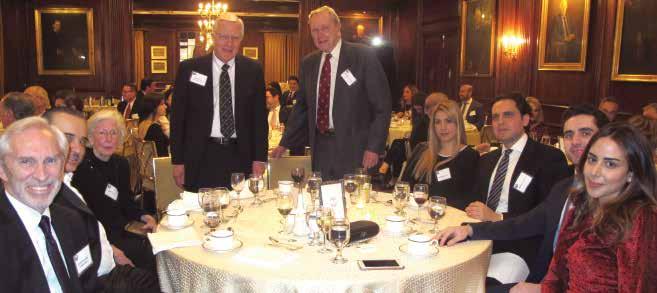
3 minute read
Women Economic Empowerment
Had someone told Rima
Kotaiche El-Husseini
’92 that in only six years she would be declared “The Most Impactful Lebanese Woman” and win the Evelyn Bustros Foundation award, she wouldn’t have believed it.
And neither did she believe it when she was called up to the stage during the Fortune Most Powerful Women Summit held in California to receive the 2016 Fortune and Goldman Sachs Global Women Leaders award. Or, a year later, when she was awarded the Woman of the Year in Social Entrepreneurship by UNIDO (United Nations Industrial Development Organization).
Her journey started simply enough. A covert entrepreneur who got antsy with her 9-to-5 bank job and, in 1996, quit and co-founded her own company with her sister.
Blessing, which specializes in luxury events’ chocolates and gifts, was a great success. So much so that it expanded into the Arab world.
This marked the beginning of her journey.
In 2012, she was selected as one of 25 women from all over the world to join the Fortune/US State Department Mentoring program, a program aiming to provide women entrepreneurs a shadowing and mentoring experience with some of the most powerful women in business.
El-Husseini was assigned to be under the mentorship of none other than the Vice-Chair of Nielson Company, Susan Whiting – voted as one of Fortune’s most powerful women.
But, upon her return to Lebanon, El-Husseini felt troubled.
“The concept of mentoring among women in business has to be introduced in Lebanon,” she said. “We too have successful women in business who can mentor and empower young women entrepreneurs.”
Indeed, why shouldn’t all Lebanese women entrepreneurs have the chance to be mentored by women leaders in business? “So I thought why don’t we create a network of women in business here?” she said. Her initiative, The
Blessing Foundation – an offshoot of her business name – was launched in 2012, with a mission to empower women in business, to start, sustain, evolve and scale up their enterprises.
With three young children at home and a full time business, the extra work seemed rather intimidating.
“But it became my passion and drive,” she said. “I felt that I had to make it easier and faster for other businesswomen to succeed.”
As part of Vital Voices Global Leadership Network, she introduced her idea: women mentoring women.
The first year, 30 mentoring ‘couples’ were paired and the year-long program was finally launched.
Even El-Husseini was amazed by the quick success of the program.
Now into its seventh year, the program has seen 200 mentoring relationships established so far.
Every year sees new initiatives such as workshops, panel discussions and various networking events. In 2016, Vital Voices chose 100 women from across the world to meet in San Francisco to create a 20-year strategy. Five percent were selected from Lebanon. All of them were from the Blessing Foundation.
Funding included grants from BLC Bank’s We Initiative and the US Embassy.
This year she started yet another project: empowering skilled women in rural Lebanon.
This new initiative under The Blessing Foundation is an online platform, ‘SheMinLebnen.com’, to sell women’s products locally and internationally – and pairing rural women with Lebanese designers in a new kind of ‘mentoring’ relationship (Supported by UN Global Compact Network Lebanon).
“I want to see women succeed,” said El-Husseini. “I believe that when women work, communities thrive, they create role models for future generations. Basically, you are creating an ecosystem at home that encourages collaboration, partnership and taking collective decisions. When kids grow in this system, you will replicate this in your family. And when you have many of those, you have a healthy society.”
For more information about the Blessing Foundation or She Min Lebnen go to: TheBlessingFoundation.com / SheMinLebnen.com












